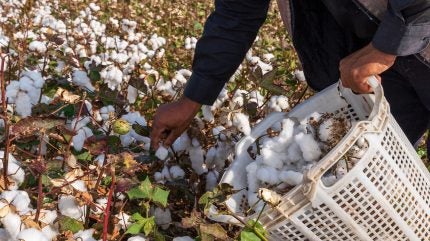
Better Cotton’s roadmap is set to expand upon years of experience and collaboration with field-level partners to mitigate vulnerabilities, amplify worker representation and improve employment conditions by the year 2030.
It advances past the organisation’s initial methodology of ‘learn, strengthen and monitor,’ which is said to have played a crucial role in establishing a baseline for advancements within the sector.

Discover B2B Marketing That Performs
Combine business intelligence and editorial excellence to reach engaged professionals across 36 leading media platforms.
This initiative marks a significant progression in Better Cotton’s Decent Work Strategy, concentrating on three pivotal and interrelated domains: farm operations, programmatic collaborations and multistakeholder cooperation.
Better Cotton decent work senior manager Leyla Shamchiyeva said: “Through collective action we can build a fairer and more resilient cotton sector in which farmers and workers are free from child labour, forced labour, workplace harassment, discrimination and violence of any kind.”
The roadmap outlines plans to provide additional guidance to field-level partners regarding the decent work indicators included in Better Cotton’s principles and criteria. It also aims to enhance labour monitoring and remediation processes and strives to promote wage transparency to establish baseline data that can lead to quantifiable enhancements.
In terms of programmes and partnerships, the focus will be on strengthening the capabilities of programme partners. The initiative seeks to forge synergistic alliances with organisations and experts sharing similar goals to exchange knowledge and best practices. Additionally, it intends to secure essential funding to expedite this critical work.

US Tariffs are shifting - will you react or anticipate?
Don’t let policy changes catch you off guard. Stay proactive with real-time data and expert analysis.
By GlobalDataAs for multistakeholder engagement, Better Cotton aims to bolster its decent work advocacy through collaborative actions with its partners. These include members from various sectors, other multistakeholder initiatives, and government bodies. Such engagement is crucial for instigating systemic changes necessary to address fundamental structural challenges within the industry.
The roadmap follows the release of its 2020–2025 Decent Work Strategy Progress Report this month. The report reviewed the organisation’s efforts over the past five years to improve working conditions. This review included a shift to an ‘assess and address’ methodology as well as the adoption of more rigorous due diligence procedures.
The report highlighted that since 2020, Better Cotton has refined its comprehension of labour risks by conducting specific risk assessments across 15 countries, with in-depth analyses in India, Pakistan, and Mali.
These evaluations have pinpointed poverty, informal employment practices, and insufficient social protection as primary factors contributing to labour rights infringements. The findings have been instrumental in revising the Better Cotton Principles and Criteria (P&C) and have led to the development of customised interventions tailored to regional-specific obstacles.
In the report, Better Cotton notes that it has improved its assurance mechanisms by incorporating worker interviews into evaluations, providing a clearer understanding of the actual conditions in the fields.
The organisation also tested indicators for forced labour to enhance risk identification and fine-tuned its monitoring of decent work practices in high-risk areas such as Uzbekistan, where specialised training is provided.
Insights gained during this period have underscored to Better Cotton that the risks of forced labour in agriculture differ from those in manufacturing and may be less overt, which necessitates enhanced verification methods.
Furthermore, the issue of child labour continues to be widespread across various regions, emphasising the need for strategies that prioritise livelihoods to tackle the root causes of vulnerability, the report adds.





